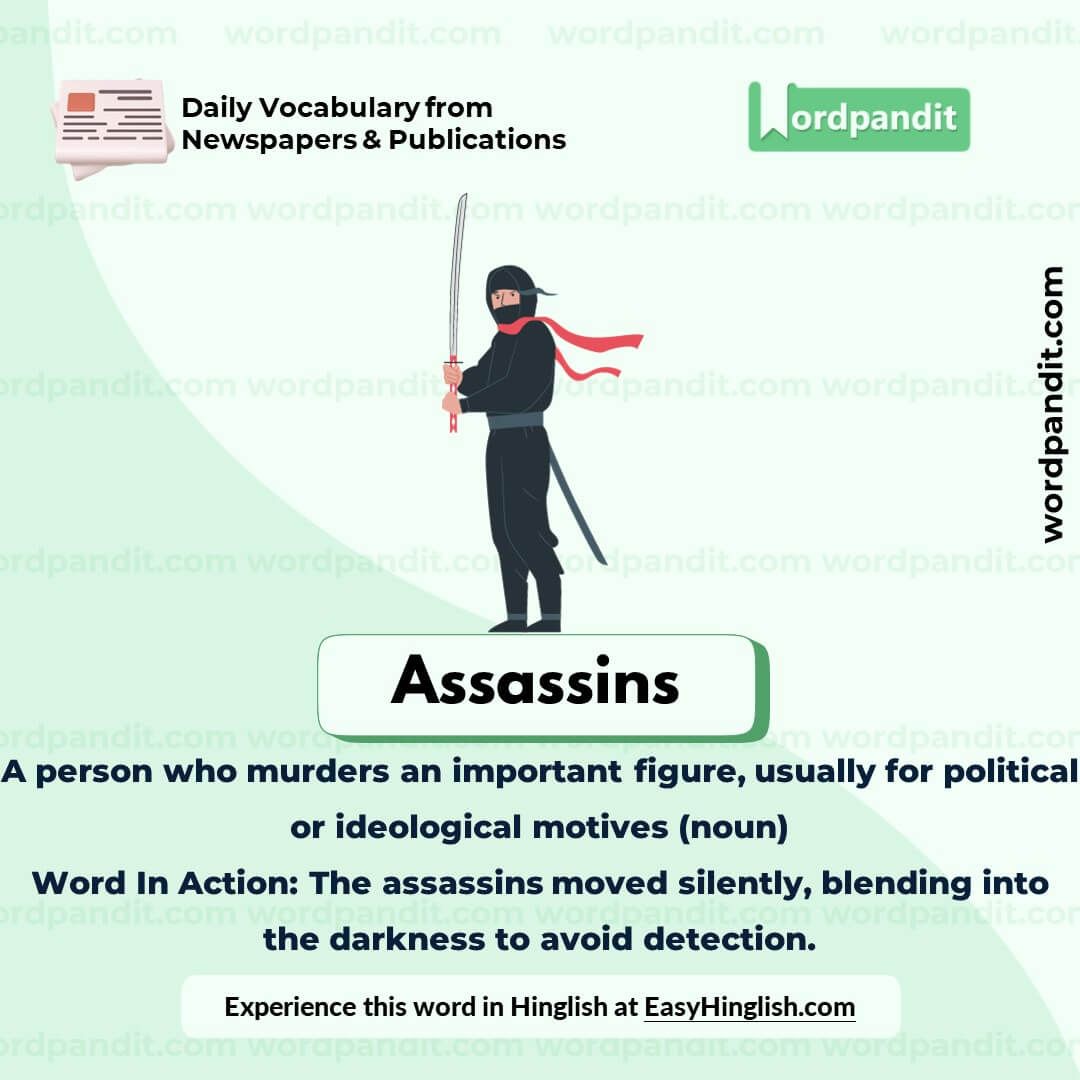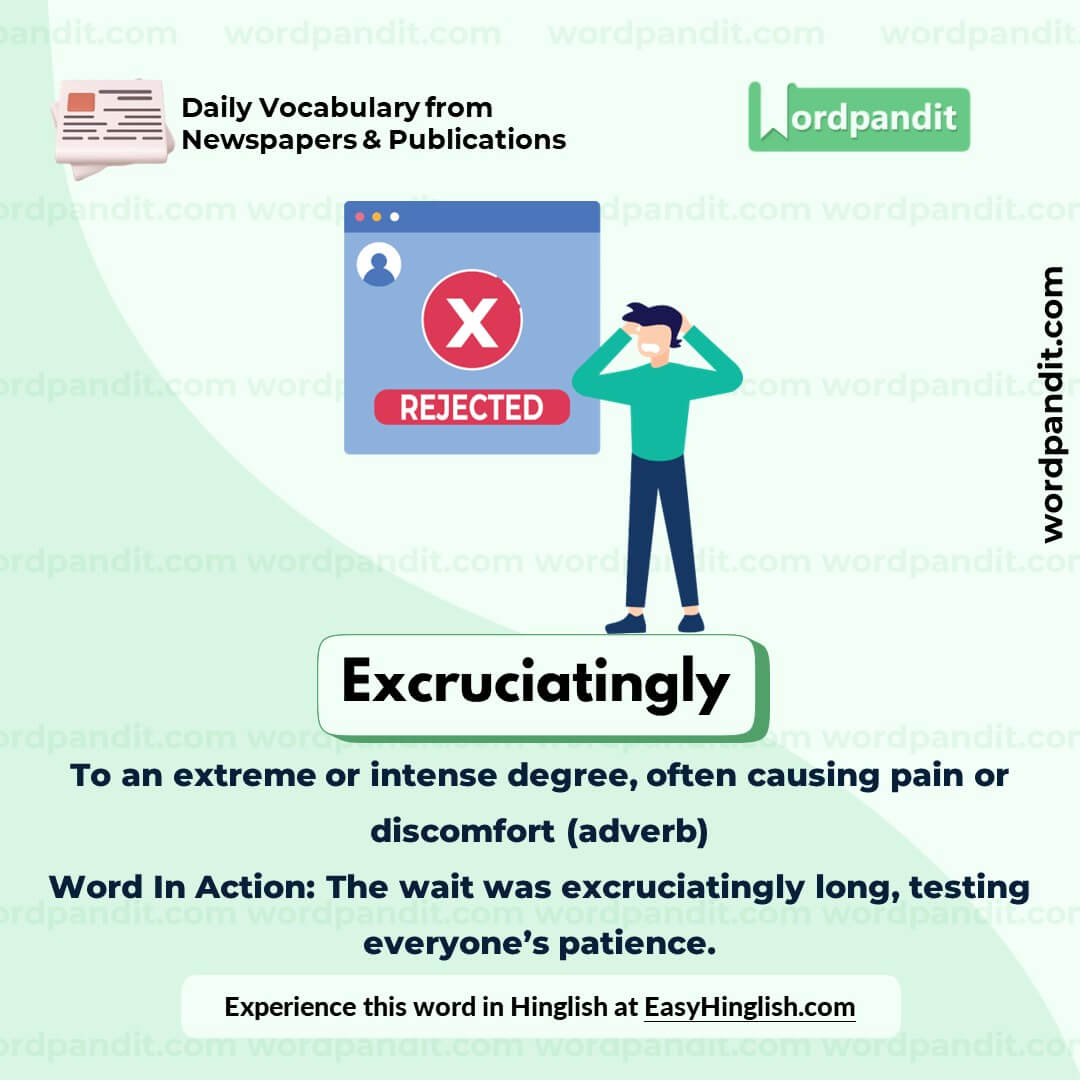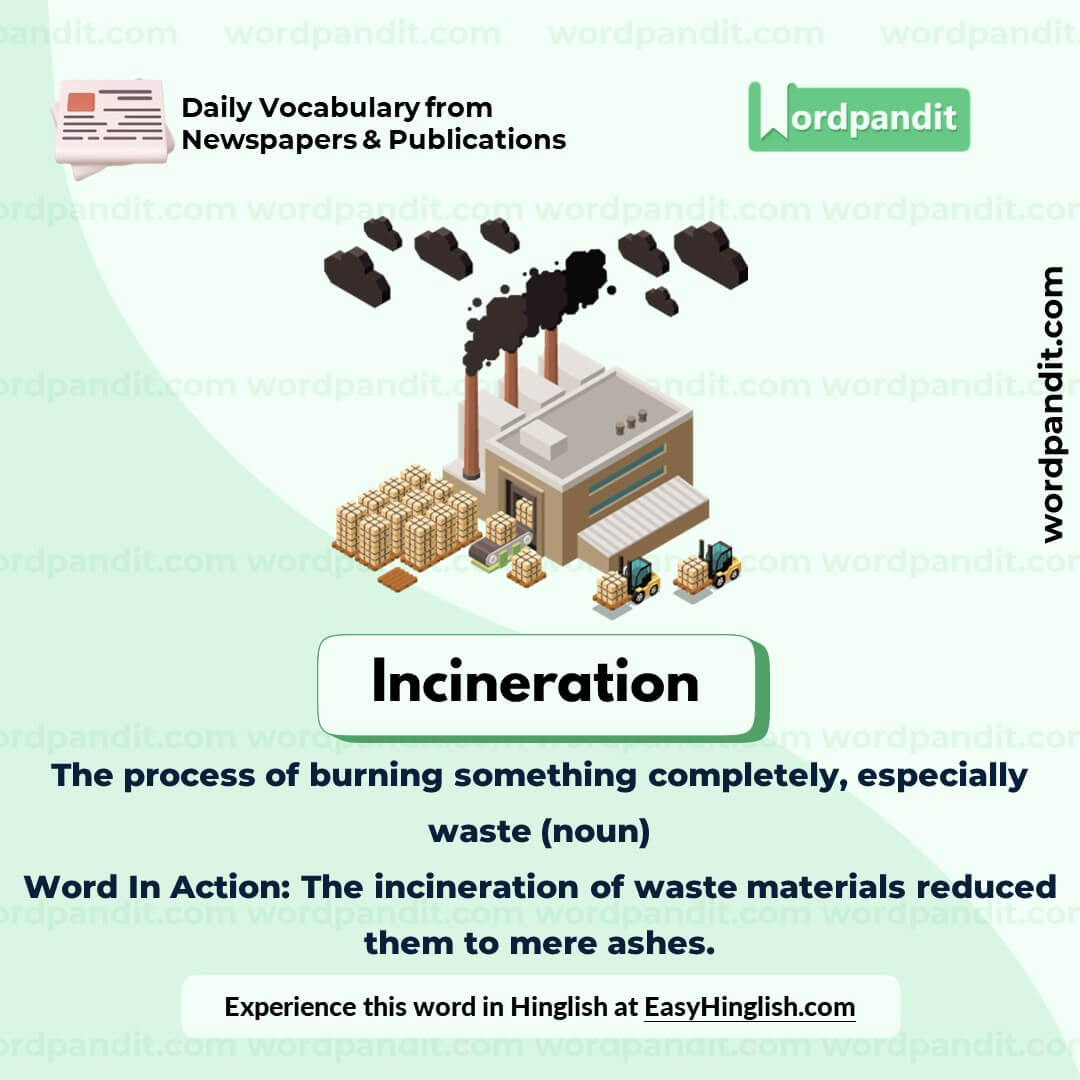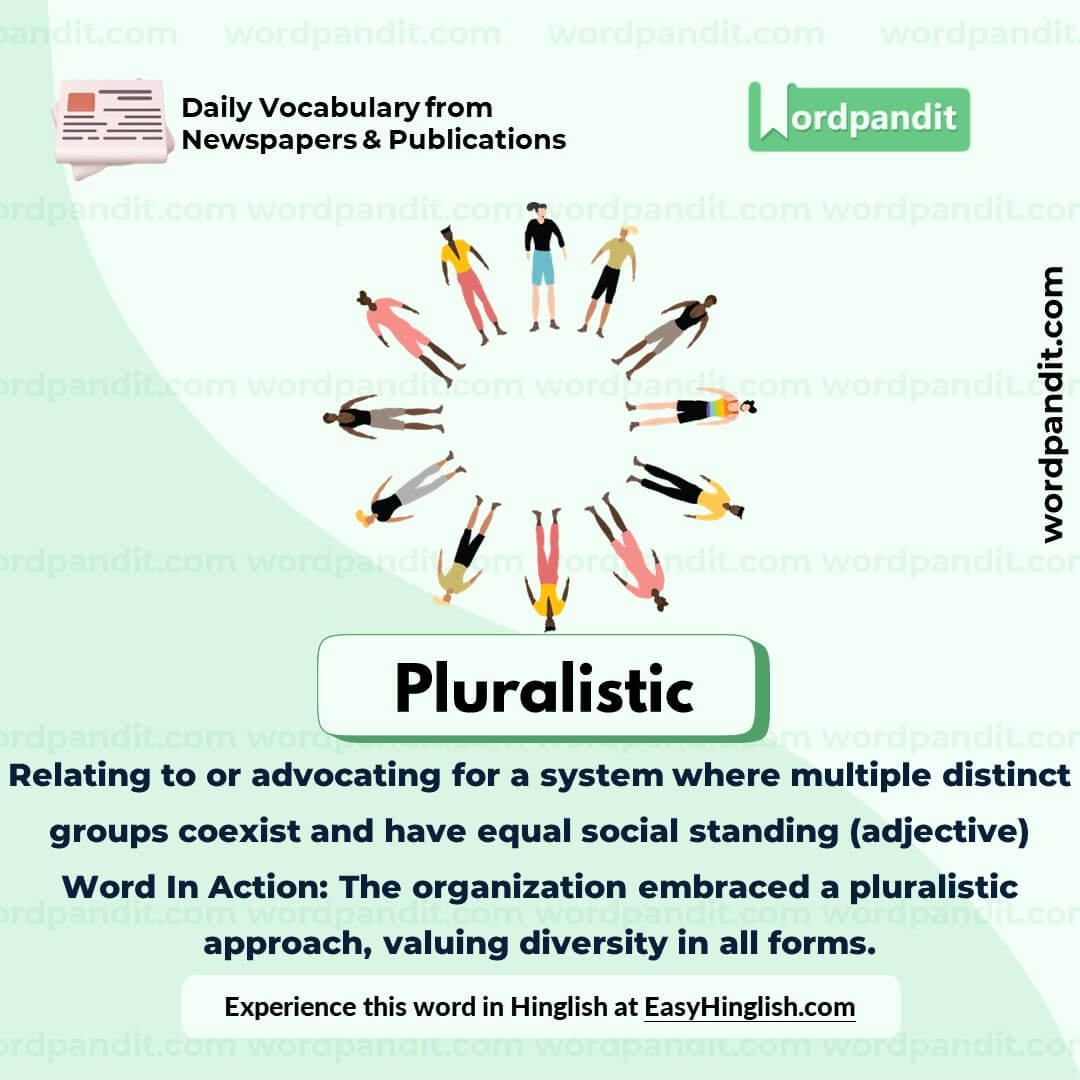Daily Vocabulary from International Newspapers and Publications
Expand Your Vocabulary with Wordpandit’s Global Vocabulary Hub
At Wordpandit, we are committed to helping you develop a truly global vocabulary by drawing from some of the most respected international publications. This section is designed to keep you ahead of the curve by introducing you to words that define global conversations and trends.
The Power of Global Sources
To help you think and communicate on a global scale, we curate vocabulary from renowned international sources, such as:
- The New York Times
- The Washington Post
- BBC
- The Guardian
- The Economist
- Scientific American
- Psychology Today
- And many more...
Stay Global, Stay Competitive
Our daily updates from international publications ensure you are consistently exposed to new words that reflect global news and developments, making sure your vocabulary is not only current but also globally relevant.
Enhance Your Global Perspective
Whether you’re preparing for international exams, aiming to excel in global business communication, or want to enhance your language skills for personal growth, Wordpandit offers the resources you need to thrive in a global context.
Effective Learning, Global Reach
Our learning methodology combines global examples, memory aids, and interactive activities, allowing you to internalize new words effectively and apply them in real-world scenarios.
Begin Your Global Vocabulary Journey Now!
Why Choose Wordpandit?
Practical Learning: Focus on words you'll actually encounter in real-world reading, enhancing your comprehension and communication skills.
Diverse Content: From current affairs to scientific breakthroughs, our varied sources expose you to vocabulary across multiple domains.
Effortless Integration: Make Wordpandit a part of your daily routine. Just a few minutes each day can significantly boost your lexicon over time.
Your Path to Vocabulary Mastery
- Visit our Daily Vocabulary section regularly
- Explore new words and their usage in context
- Practice incorporating these words into your own writing and speech
- Track your progress as your vocabulary expands
Start Your Journey Today
Embark on your vocabulary enhancement journey with Wordpandit. By consistently engaging with our daily posts, you'll build a robust vocabulary that serves you well in academic, professional, and personal contexts.
Remember, a word a day keeps linguistic limitations at bay. Make Wordpandit your daily companion in the quest for vocabulary excellence!
WORD-1: Ascendance
Context:
"Trump and President Biden, was reset after a televised debate that ended Mr. Biden’s bid for re-election and paved the way for Ms. Harris’s midsummer ascendance — and it took a violent turn when two would-be assassins made separate attempts on Mr. Trump’s life." - The New York Times
Explanatory Paragraph:
The word ascendance signifies a rise in power or influence, often implying a gradual increase in authority or control over time. In the given context, it describes a pivotal moment in which Ms. Harris gained significant political prominence.
Meaning: The condition of having dominant influence or control (noun)
Pronunciation: uh-SEN-duhns
Difficulty Level: ⭐⭐⭐ (Intermediate)
Etymology: From Latin ascendere meaning "to climb up"
Synonyms & Antonyms:
Synonyms: dominance, supremacy, control, authority, influence
Antonyms: decline, subordination, descent, inferiority, weakness
Usage Examples:
- With each victory, her ascendance in the industry became undeniable.
- The ascendance of digital media has transformed traditional journalism.
- The team’s ascendance to the top of the league surprised many fans.
- Many historians note the ascendance of new political ideologies in the early 20th century.
Cultural Reference:
"The rise of new leadership often brings an era of ascendance, challenging old power structures." - Common political analysis
Think About It:
What factors do you think contribute most to a person's ascendance in their career or field?
Quick Activity:
List three historical figures whose ascendance had a major impact on society. What factors led to their rise in influence?
Memory Tip:
Think of "ascendance" as "ascending" up the ranks to hold influence or control.
Real-World Application:
In business and career discussions, "ascendance" can be used to describe someone's rising influence, such as in "the ascendance of a tech company in the global market."
WORD-2: Assassins
Context:
"Trump and President Biden, was reset after a televised debate that ended Mr. Biden’s bid for re-election and paved the way for Ms. Harris’s midsummer ascendance — and it took a violent turn when two would-be assassins made separate attempts on Mr. Trump’s life." - The New York Times
Explanatory Paragraph:
An assassin is someone who deliberately kills a prominent figure, often for political or ideological reasons. In the context here, it describes individuals who attempted to end Mr. Trump’s life, showcasing the severe risk posed by those intent on targeting influential leaders.
Meaning: A person who murders an important figure, usually for political or ideological motives (noun)
Pronunciation: uh-SAS-in
Difficulty Level: ⭐⭐⭐⭐ (Advanced)
Etymology: From Arabic ḥashāshīn, originally referring to a medieval Islamic sect known for targeted killings
Synonyms & Antonyms:
Synonyms: killer, murderer, hitman, slayer, eliminator
Antonyms: protector, guardian, defender, savior
Usage Examples:
- The assassin managed to evade security before making an attempt on the leader's life.
- Historical records often debate the true motives of famous assassins throughout history.
- The novel centers around a skilled assassin hired to eliminate a corrupt official.
- Many world leaders have faced threats from assassins during their careers.
Cultural Reference:
"Assassination has never changed the history of the world." - Benjamin Disraeli
Think About It:
Why do you think certain individuals resort to assassination as a way to achieve their goals?
Quick Activity:
Research a famous assassination in history. Briefly write about the motive behind the act and its impact on society.
Memory Tip:
Remember "assassin" by linking it to "a sinister assignment" — a task involving targeted killing.
Real-World Application:
The term "assassin" is used in journalism, history, and political science to describe individuals who use violence to influence politics and power structures.
WORD-3: Excruciatingly
Context:
"More than 78 million people have already voted. And as we head into the final day of voting, polling suggests that two candidates who could not be more different — who fundamentally disagree on weighty matters of the economy, women’s rights and the very purpose of government — are locked in an excruciatingly tight contest, with all seven battleground states still in play." - The New York Times
Explanatory Paragraph:
The adverb excruciatingly is used to emphasize an extreme degree of something, often related to pain, difficulty, or intensity. Here, it describes just how tense and close the election contest is, highlighting the intense suspense and near-equal support for each candidate.
Meaning: To an extreme or intense degree, often causing pain or discomfort (adverb)
Pronunciation: eks-KROO-shee-ay-ting-lee
Difficulty Level: ⭐⭐⭐⭐ (Advanced)
Etymology: From Latin excruciatus meaning "tormented" or "tortured," related to crux meaning "cross"
Synonyms & Antonyms:
Synonyms: painfully, agonizingly, unbearably, intensely
Antonyms: comfortably, easily, gently, mildly
Usage Examples:
- The wait for the test results was excruciatingly long.
- The hiker found the steep climb excruciatingly difficult, but she pushed through.
- The film’s ending was excruciatingly sad, leaving the audience in tears.
- He felt excruciatingly nervous before delivering his speech.
Cultural Reference:
"Patience is excruciatingly painful, but it is the key to wisdom." - Common proverb
Think About It:
Why do you think people often describe intense experiences as "excruciatingly" difficult or painful? What effect does it have on the listener?
Quick Activity:
Write a sentence describing a situation where you felt excruciatingly tense or nervous. What was it about that situation that made it feel so intense?
Memory Tip:
Think of "excruciatingly" as "extreme-cruel-painfully," a way to remember its connection to intense or unbearable feelings.
Real-World Application:
"Excruciatingly" is often used in storytelling or journalism to convey extreme tension or suspense, adding emotional weight to descriptions.
WORD-4: Incineration
Context:
"Magnus describes the tunnel as ‘the back porch,’ mainly used to store trash scheduled for incineration in Earth’s atmosphere." - Scientific American
Explanatory Paragraph:
Incineration refers to the process of burning waste material to reduce its volume, often converting it into ash, gas, or heat. It’s commonly used in waste management to dispose of items that can’t be recycled, as described here where trash is set to be burned as it enters Earth's atmosphere.
Meaning: The process of burning something completely, especially waste (noun)
Pronunciation: in-sin-uh-RAY-shun
Difficulty Level: ⭐⭐⭐ (Intermediate)
Etymology: From Latin incinerare meaning "to turn to ashes," from in- + cinis ("ashes")
Synonyms & Antonyms:
Synonyms: burning, combustion, cremation, blazing
Antonyms: extinguishing, quenching, smothering, dousing
Usage Examples:
- The incineration of medical waste is carefully monitored to prevent pollution.
- They opted for incineration to dispose of the hazardous materials safely.
- Incineration is one method cities use to manage large amounts of garbage.
- The waste incineration plant converts garbage into energy for local homes.
Cultural Reference:
"The fire within the incinerator symbolizes both destruction and renewal in many cultures." - Common interpretation in literature and film
Think About It:
What are some environmental concerns related to incineration as a waste disposal method?
Quick Activity:
Identify three types of waste typically disposed of by incineration. How might this method impact air quality?
Memory Tip:
To remember "incineration," think of "into cinders"—a process where items are burned to ashes.
Real-World Application:
Incineration is widely used in waste management, especially in places with limited landfill space, though it requires strict regulation to prevent pollution.
WORD-5: Pluralistic
Context:
"A positive-sum society is a more pluralistic and tolerant society because all its members are encouraged to pioneer their own specialty." - The New York Times
Explanatory Paragraph:
Pluralistic describes a society or environment where multiple groups, perspectives, or beliefs coexist harmoniously, with each respected as part of a broader community. In the context here, it implies that a positive-sum society is one that celebrates diversity and encourages individuals to contribute uniquely to the whole.
Meaning: Relating to or advocating for a system where multiple distinct groups coexist and have equal social standing (adjective)
Pronunciation: ploo-ruh-LIS-tik
Difficulty Level: ⭐⭐⭐ (Intermediate)
Etymology: From Latin pluralis meaning "more than one," referring to diversity within unity
Synonyms & Antonyms:
Synonyms: diverse, inclusive, multicultural, tolerant
Antonyms: monolithic, homogeneous, exclusive, intolerant
Usage Examples:
- The country’s pluralistic culture allows people from various backgrounds to express their traditions freely.
- Her classroom is a pluralistic environment where every student’s perspective is valued.
- They strive to create a pluralistic society that respects religious and cultural diversity.
- A pluralistic approach to education acknowledges and includes various learning styles and abilities.
Cultural Reference:
"America has often been described as a ‘melting pot’ for its pluralistic society, blending many cultures into one." - Common sociological metaphor
Think About It:
How does a pluralistic society benefit from embracing a wide range of perspectives?
Quick Activity:
Think of an organization, community, or country you know that embodies pluralism. What makes it pluralistic?
Memory Tip:
Remember "pluralistic" by thinking of "plural," which means "many"—it’s a society of many ideas and identities coexisting.
Real-World Application:
In workplaces, pluralistic policies foster diverse viewpoints, enabling innovation by valuing contributions from varied cultural and professional backgrounds.


















